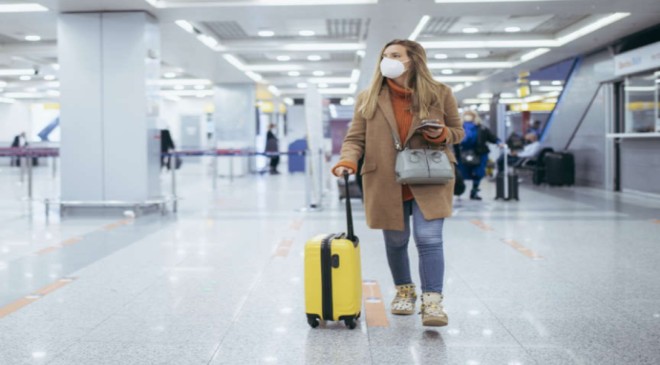Courtesy of Delta Air LinesTravelers have been masking up on airplanes for nearly two years. How much longer?After the U.S. Centers for Disease Control and Prevention (CDC) eased its indoor mask guidance earlier this year, the move sparked questions and debates about whether the federal transportation mask mandate, coming up for renewal on April 18, will be eased as well. Dr. Ashish Jha, dean of Brown University’s School of Public Health and the new White House COVID-19 response coordinator, said in an April 11 interview that extending the mask mandate is “absolutely on the table.”
When asked on NBC’s Today show whether the mask mandate would likely be renewed, Jha said, “I know the CDC’s working on a scientific framework for how to answer that. We’re going to see that framework come out I think in the next few days.”
On March 10, the TSA announced that it had extended the federal transportation mask mandate to April 18—it had been previously set to expire one month earlier on March 18.
“CDC will work with government agencies to help inform a revised policy framework for when, and under what circumstances, masks should be required in the public transportation corridor,” TSA said in a statement—hinting at the possibility that the mask restrictions will, in fact, be eased or at least adjusted after April 18.
TSA said the revised framework will be based on COVID-19 community levels, risk of new variants, national data, and the latest science.
The travel and transportation mask mandate dates back to January 2021, when the Biden administration and the CDC issued orders making it obligatory to wear masks on airplanes, airports, ships, ferries, trains, subways, buses, and taxis and in train, bus, and subway stations. (School buses and vans are exempt as of February 25.) U.S. airlines had already been requiring that passengers and crew wear masks since mid-2020.
But the administration is under mounting pressure to drop the transportation mask mandate.
On March 23, the top executives at the nation’s leading airlines sent a letter to President Biden urging the administration to drop the federal transportation mask mandate and the international testing requirement for travelers entering the U.S.
“Much has changed since these measures were imposed and they no longer make sense in the current public health context,” read the letter, which was signed by the CEOs of Alaska, American, Delta, Hawaiian, JetBlue, Southwest, and United.
“It is critical to recognize that the burden of enforcing both the mask and predeparture testing requirements has fallen on our employees for two years now . . . and subjects them to daily challenges by frustrated customers,” the letter stated.
A large portion of travelers is also ready for masks to come off—54 percent said they want the federal mask mandate to expire, according to a new survey released by travel app TripIt from Concur. TripIt surveyed more than 700 of its U.S.-based users this month and found that just one-third hope the mask mandate will be further extended, while 16 percent didn’t have a preference either way.
What will happen to the airline mask mandate after April 18?
So, what happens after April 18? Will the mask mandate be extended again?
Dr. Amesh Adalja, an infectious disease expert and senior scholar at the Johns Hopkins Center for Health Security, says he believes there is a good chance the federal mask mandate will not be renewed after April 18. “At this stage of the pandemic, with a level of immunity in the population and the tools for treatment, masks have lower importance,” Dr. Adalja tells AFAR. “It is important to recognize that individuals can continue to wear masks as their risk tolerance dictates, individual [airlines] can set their own mask policies, and that one-way masking, especially with the high-quality masks available today, works.”
Dr. Thomas Russo, chief of infectious diseases at the University of Buffalo’s Jacobs School of Medicine and Biomedical Sciences, notes that even if the mandate is not extended on April 18, several groups of people should consider wearing masks while traveling—even if it’s not required:
- Those who are unvaccinated
- Those who are immunocompromised
- Those who are over 50, have significant underlying health conditions or diseases, and/or are pregnant and have yet to receive a COVID vaccine booster shot
- Those who live with anyone who falls into the above categories
“It’s going to [eventually] shift from mandate to individual choice or responsibility,” predicts Dr. Russo. But he cautions that, just as we have seen so far with the pandemic, new variants can enter the picture, sometimes with great speed and aggression, which could rapidly change the public health protocols and requirements again.
Concerns and controversy over the mask mandate
The Association of Flight Attendants-CWA (AFA), a union that represents flight attendants who work at airlines that include United, Alaska, and Hawaiian, among others, said in a February 25 statement said that some of its members support the mask mandate remaining in place while others do not.
“The airplane is a unique, but controlled environment for everyone’s safety,” the union stated, adding that factors that could contribute to the mandate remaining in place include the fact that “our youngest passengers do not yet have access to the vaccine; safety procedures are typically harmonized around the world; [and] passenger confidence in the safety of air travel is critical.”
Their main concern, however, is that as long as the mask mandate is in place, flight attendants must enforce it and the AFA is asking that the traveling public focus on “backing up flight attendants simply doing our job.” Their plea comes at a time when air rage, often prompted by the federal masking policy, has been on the rise and can put flight attendants and crew in harm’s way.
In its latest report dated April 4, 2022, the Federal Aviation Administration (FAA) said that airlines have already reported 1,081 incidents involving unruly passengers this year, and 707—or 65 percent—are related to face mask issues.
In an effort to combat the problem, this past fall, the U.S. doubled the fine for people who violate the mask-wearing requirement on planes, trains, and other forms of public transit.
First-time offenders now face a potential fine of $500 to $1,000 and second-time offenders could pay $1,000 to $3,000; previously, the fines had started at $250 and went up to $1,500 for repeat offenders.
When the new fines went into place, President Joe Biden rebuked people who have been taking out their anger about the mask requirement on flight crews. “And by the way, show some respect,” Biden said. “The anger you see on television toward flight attendants and others doing their job is wrong. It’s ugly.”
The mask penalties are separate from any civil penalties the FAA can issue for unruly behavior—the FAA can now propose up to $37,000 per violation for unruly passenger cases. (Previously, the maximum civil penalty per violation was $25,000; one incident can result in multiple violations.)
As for international travel, President Biden has also made it a requirement that all international arrivals, vaccinated or not, be tested for COVID no more than one calendar day before flying to the United States. And all foreign nationals entering the U.S. must be vaccinated.
When asked during an April 5 press briefing if the U.S. has plans to change the international testing requirement, Jeff Zients, President Biden’s outgoing COVID-19 coordinator, answered, “No, there are no plans to change the international travel requirements at this point.”
That news may come as a disappointment to travelers—60 percent of whom want the COVID-19 testing requirement for inbound international travelers to be removed, according to the TripIt survey. The survey also found that 44 percent would be more likely to travel if the requirement was dropped.









































